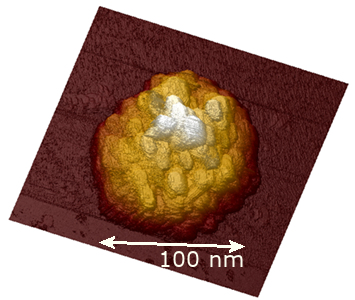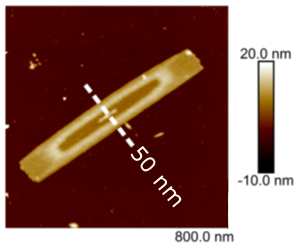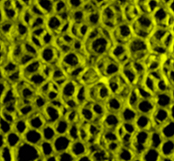 Fabrication of 1D and 2D CVD Diamond Nanostructures from Block Copolymer Micelles (Templated growth)
Fabrication of 1D and 2D CVD Diamond Nanostructures from Block Copolymer Micelles (Templated growth)
We have developed a method to make controlled nanostructures of CVD diamond by using 1-dimensional and 2-dimensioal block-copolymer micellar structures as templates. A block copolymer is a type of polymer composed of two or more chemically distinct blocks, or sections, linked together. These blocks are typically formed by different monomers and are covalently bonded to each other. Block copolymers can have unique properties and under the right conditions they can self-assemble on a surface to form various structures. Variation of the polymer components and growth conditions allows the self-assembly to be guided to form different 3D micelle structures on the surface. When these substrates as placed into a CVD reactor, the polymer pyrolyses and forms a carbide, and then converts into diamond. Thus, the original micellar structure is transformed into diamond. The diamond can be undoped, or B-doped such that the nanostrucrures can be insulating, semiconducting or superconducing depneding on the B-doping level. It is also possible to implant N into these isolated structures to form NV centres for quantum applications.

By altering the type of polymer and deposition conditions we have successful fabricated a range of nanostructures, see the table below.
| Shape | SEM/AFM Picture | Possible Applications |
|---|---|---|
| Short and long rods, straight or branched. |  |
Nanowire interconnects in semi/superconducting devices. The longest rods we've made so far are 200 μm long by 100 nm wide. |
| Hexagons/Circles |  |
Carbon dots, or isolated single-photon sources using NV centres. |
| 'Squid-like' structures with trailing tentacles |  |
Neural nets with the conducting tentacles linking the bodies together, superconducting quantum interference devices (SQuIDs) of magnetic field sensing |
| Rings or hollow rods |  |
Quantum switches |
| 3D porous networks |  (Simulation) |
Supercapacitors |
Example papers
- Matthew Brumwell, PhD, "Investigations into the Crystallisation-Driven Self-Assembly of Poly(ferrocenylsilane)-based Polymers as a Route to Fabricating Nanoscale Templates for the Chemical Vapour Deposition of Diamond", University of Bristol, September 2023.
